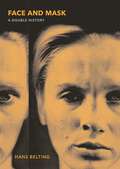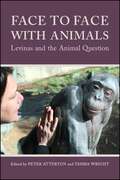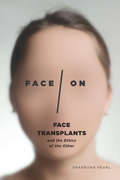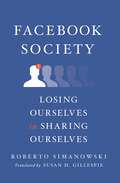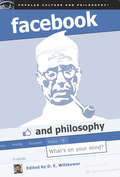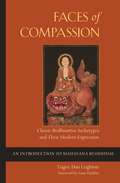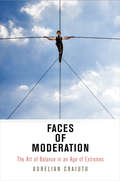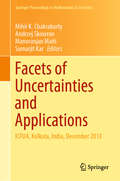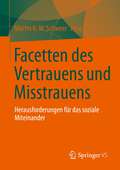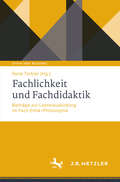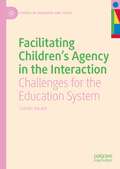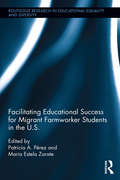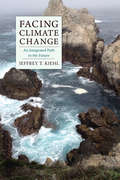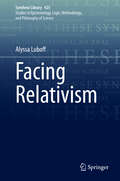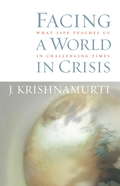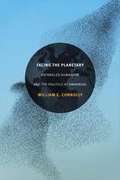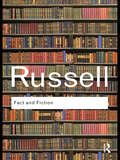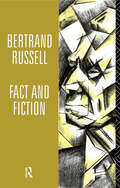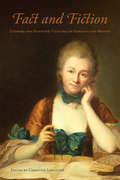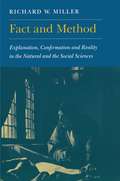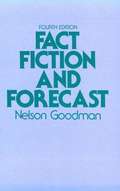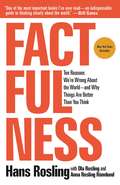- Table View
- List View
Face and Mask: A Double History
by Hans BeltingA cultural history of the face in Western art, ranging from portraiture in painting and photography to film, theater, and mass mediaThis fascinating book presents the first cultural history and anthropology of the face across centuries, continents, and media. Ranging from funerary masks and masks in drama to the figural work of contemporary artists including Cindy Sherman and Nam June Paik, renowned art historian Hans Belting emphasizes that while the face plays a critical role in human communication, it defies attempts at visual representation.Belting divides his book into three parts: faces as masks of the self, portraiture as a constantly evolving mask in Western culture, and the fate of the face in the age of mass media. Referencing a vast array of sources, Belting's insights draw on art history, philosophy, theories of visual culture, and cognitive science. He demonstrates that Western efforts to portray the face have repeatedly failed, even with the developments of new media such as photography and film, which promise ever-greater degrees of verisimilitude. In spite of sitting at the heart of human expression, the face resists possession, and creative endeavors to capture it inevitably result in masks—hollow signifiers of the humanity they're meant to embody.From creations by Van Eyck and August Sander to works by Francis Bacon, Ingmar Bergman, and Chuck Close, Face and Mask takes a remarkable look at how, through the centuries, the physical visage has inspired and evaded artistic interpretation.
Face to Face with Animals: Levinas and the Animal Question
by Peter Atterton; Tamra WrightThis is the first volume of primary and secondary source material dedicated solely to the animal question in Levinas. Drawing on previously unpublished material, including the recent discovery and digitization of the original French recording of an interview with Levinas that took place in 1986, it seeks to give fresh impetus to the debate surrounding the moral status of animals in Levinas's work. The book offers ten essays by leading scholars, along with a general introduction that places Levinas's philosophy in the context of the growing field of animal ethics. The aim of the volume is to encourage dialogue on how we can extend Levinas's ethics beyond its traditional human confines and to spur further research on the opportunities and challenges it raises.
Face/On: Face Transplants and the Ethics of the Other
by Sharrona PearlAre our identities attached to our faces? If so, what happens when the face connected to the self is gone forever—or replaced? In Face/On, Sharrona Pearl investigates the stakes for changing the face–and the changing stakes for the face—in both contemporary society and the sciences. The first comprehensive cultural study of face transplant surgery, Face/On reveals our true relationships to faces and facelessness, explains the significance we place on facial manipulation, and decodes how we understand loss, reconstruction, and transplantation of the face. To achieve this, Pearl draws on a vast array of sources: bioethical and medical reports, newspaper and television coverage, performances by pop culture icons, hospital records, personal interviews, films, and military files. She argues that we are on the cusp of a new ethics, in an opportune moment for reframing essentialist ideas about appearance in favor of a more expansive form of interpersonal interaction. Accessibly written and respectfully illustrated, Face/On offers a new perspective on face transplant surgery as a way to consider the self and its representation as constantly present and evolving. Highly interdisciplinary, this study will appeal to anyone wishing to know more about critical interventions into recent medicine, makeover culture, and the beauty industry.
Facebook Society: Losing Ourselves in Sharing Ourselves
by Roberto SimanowskiFacebook claims that it is building a “global community.” Whether this sounds utopian, dystopian, or simply self-promotional, there is no denying that social-media platforms have altered social interaction, political life, and outlooks on the world, even for people who do not regularly use them. In this book, Roberto Simanowski takes Facebook as a starting point to investigate our social-media society—and its insidious consequences for our concept of the self.Simanowski contends that while they are often denounced as outlets for narcissism and self-branding, social networks and the practices they cultivate in fact remake the self in their image. Sharing is the outsourcing of one’s experiences, encouraging unreflective self-narration rather than conscious self-determination. Instead of experiencing the present, we are stuck ceaselessly documenting and archiving it. We let our lives become episodic autobiographies whose real author is the algorithm lurking behind the interface. As we go about accumulating more material for the platform to arrange for us, our sense of self becomes diminished—and Facebook shapes a subject who no longer minds. Social-media companies’ relentless pursuit of personal data for advertising purposes presents users with increasingly targeted, customized information, attenuating cultural memory and fracturing collective identity. Presenting a creative, philosophically informed perspective that speaks candidly to a shared reality, Facebook Society asks us to come to terms with the networked world for our own sake and for all those with whom we share it.
Facebook and Philosophy
by D. E. WittkowerFacebook and Philosophy is an entertaining, multi-faceted exploration of what Facebook means for us and for our relationships. With discussions ranging from the nature of friendship and its relationship to "friending," to the (debatable) efficacy of "online activism," this book is the most extensive and systematic attempt to understand Facebook yet. And with plenty of new perspectives on Twitter and Web 2.0 along the way, this fun, thought-provoking book is a serious and significant contribution for anyone working with social media, whether in academia, journalism, public relations, activism, or business. Exploring far-reaching questions - Can our interactions on Facebook help us care about each other more? Does Facebook signal the death of privacy, or (perhaps worse yet) the death of our desire for privacy? - Facebook and Philosophy is vital reading for anyone involved in social networks today.
Faces of Compassion: Classic Bodhisattva Archetypes and Their Modern Expression — An Introduction to Mahayana Buddhism
by Taigen Dan Leighton Joan Halifax RoshiFaces of Compassion introduces us to enlightened beings, the bodhisattvas of Buddhist lore. They're not otherworldly gods with superhuman qualities but shining examples of our own highest potential. Archetypes of wisdom and compassion, the bodhisattvas of Buddhism are powerful and compelling images of awakening. Scholar and Zen teacher Taigen Dan Leighton engagingly explores the imagery and lore of the seven most important of these archetypal figures, bringing them alive as psychological and spiritual wellsprings. Emphasizing the universality of spiritual ideas, Leighton finds aspects of bodhisattvas expressed in a variety of familiar modern personages - from Muhammad Ali to Mahatma Gandhi, from Bob Dylan to Henry Thoreau, and from Gertrude Stein to Mother Teresa. This edition contains a revised and expanded introduction that frames the book as a exciting and broad-scoped view of Mahayana Buddhism. It's updated throughout to make it of more use to scholars and a perfect companion to survey courses of world religions or a 200-level course on Buddhism.
Faces of Moderation: The Art of Balance in an Age of Extremes
by Aurelian CraiutuAristotle listed moderation as one of the moral virtues. He also defined virtue as the mean between extremes, implying that moderation plays a vital role in all forms of moral excellence. But moderation's protean character—its vague and ill-defined omnipresence in judgment and action—makes it exceedingly difficult to grasp theoretically. At the same time, moderation seems to be the foundation of many contemporary democratic political regimes, because the competition between parties cannot properly function without compromise and bargaining. The success of representative government and its institutions depends to a great extent on the virtue of moderation, yet the latter persists in being absent from both the conceptual discourse of many political philosophers and the campaign speeches of politicians fearful of losing elections if they are perceived as moderates.Aurelian Craiutu aims to resolve this paradox. Examining the writings of prominent twentieth-century thinkers such as Raymond Aron, Isaiah Berlin, Norberto Bobbio, Michael Oakeshott, and Adam Michnik, he addresses the following questions: What does it mean to be a moderate voice in political and public life? What are the virtues and limits of moderation? Can moderation be the foundation for a successful platform or party? Though critics maintain that moderation is merely a matter of background and personal temperament, Craiutu finds several basic norms that have consistently appeared in different national and political contexts. The authors studied in this book defended pluralism, of ideas, interests, and social forces, and sought to achieve a sound balance between them through political trimming. They shared a preoccupation with political evil and human dignity, but refused to see the world in Manichaean terms that divide it neatly into the forces of light and those of darkness. Faces of Moderation argues that moderation remains crucial for today's encounters with new forms of extremism and fundamentalism across the world.
Facets of Uncertainties and Applications
by Andrzej Skowron Mihir K. Chakraborty Manoranjan Maiti Samarjit KarSince the emergence of the formal concept of probability theory in the seventeenth century, uncertainty has been perceived solely in terms of probability theory. However, this apparently unique link between uncertainty and probability theory has come under investigation a few decades back. Uncertainties are nowadays accepted to be of various kinds. Uncertainty in general could refer to different sense like not certainly known, questionable, problematic, vague, not definite or determined, ambiguous, liable to change, not reliable. In Indian languages, particularly in Sanskrit-based languages, there are other higher levels of uncertainties. It has been shown that several mathematical concepts such as the theory of fuzzy sets, theory of rough sets, evidence theory, possibility theory, theory of complex systems and complex network, theory of fuzzy measures and uncertainty theory can also successfully model uncertainty.
Facetten des Vertrauens und Misstrauens: Herausforderungen für das soziale Miteinander
by Martin K. W. SchweerDer Band stellt den aktuellen Forschungsstand zu dem gesellschaftlich hochrelevanten Themenkomplex um Vertrauen und Misstrauen zusammen. In Forschung und Transfer zeigt sich, welche wertvollen Beiträge die diesbezügliche Forschung leistet, wenn es um die Lösung konkreter sozialer Probleme und um die Bewältigung gesellschaftlicher Herausforderungen geht.
Fachlichkeit und Fachdidaktik: Beiträge zur Lehrerausbildung im Fach Ethik/Philosophie (Ethik und Bildung)
by René TorklerDer Band versammelt Beiträge zum Verhältnis von Fachdidaktik und Lehrerausbildung im Fach Ethik/Philosophie. Dabei kommen Perspektiven aus mehreren deutschen Bundesländern, Österreich sowie der Schweiz zu Wort und auch Unterschiede zwischen verschiedenen Schulformen werden in den Blick genommen. Inhaltlich befassen sich die Beiträge vor allem mit der Bedeutung der Fachlichkeit für die philosophisch-ethische Lehrerbildung, dem Verhältnis von philosophischer und fachdidaktischer Reflexion sowie der Rolle von Empirie und Wissenschaft für die fachdidaktische Ausbildung von Lehrerinnen und Lehrern.
Facilitating Children's Agency in the Interaction: Challenges for the Education System (Studies in Childhood and Youth)
by Claudio BaraldiThis book analyzes children's agency as interactional achievement in formal and informal contexts of education and illuminates how agency can be encouraged and supported in these educational contexts. Taking a sociological approach, the author deals with children as social agents rather than learners and considers structures of interaction which encourage and support agency, rather than teaching. The book draws from field research conducted over more than twenty years in a variety of Italian and international contexts. This book is unique in providing a theoretical reflection on the social structures that can support children’s agency, as well as a large amount of examples which show how these structures and agency work.
Facilitating Educational Success For Migrant Farmworker Students in the U.S. (Routledge Research in Educational Equality and Diversity)
by Patricia Perez Maria Estela ZarateGrounded in empirical research, this timely volume examines the challenges to academic success that migrant farmworker students face in the U.S. Providing an original framework for academic success among migrant farmworker students and applying a diverse range of methodological approaches, chapter authors address a range of topics, including English Language Learner development; support for educators who work with migrant farmworker students; promotion of migrant family involvement; and college access. This book provides pragmatic strategies and interventions and considers practical and policy implications to increase migrant student academic achievement and support migrant farmworker students and families.
Facing Climate Change: An Integrated Path to the Future
by Jeffrey KiehlFacing Climate Change explains why people refuse to accept evidence of a warming planet and shows how to move past partisanship to reach a consensus for action. A climate scientist and licensed Jungian analyst, Jeffrey T. Kiehl examines the psychological phenomena that twist our relationship to the natural world and their role in shaping the cultural beliefs that distance us further from nature. He also accounts for the emotions triggered by the lived experience of climate change and the feelings of fear and loss they inspire, which lead us to deny the reality of our warming planet.But it is not too late. By evaluating our way of being, Kiehl unleashes a potential human emotional understanding that can reform our behavior and help protect the Earth. Kiehl dives deep into the human brain's psychological structures and human spirituality's imaginative power, mining promising resources for creating a healthier connection to the environment—and one another. Facing Climate Change is as concerned with repairing our social and political fractures as it is with reestablishing our ties to the world, teaching us to push past partisanship and unite around the shared attributes that are key to our survival. Kiehl encourages policy makers and activists to appeal to our interdependence as a global society, extracting politics from the process and making decisions about our climate future that are substantial and sustaining.
Facing Evil
by John KekesJohn Kekes demonstrates that the prevalence of evil presents a fundamental problem for our secular sensibility and develops the theory of character-morality as a response. He believes that the main sources of evil are produced by our character defects and through unchosen ations and that we can increase our control over the evil we cause.
Facing Evil
by John KekesArguing that the prevalence of evil presents a fundamental problem for our secular sensibility, John Kekes develops a conception of character-morality as a response. He shows that the main sources of evil are habitual, unchosen actions produced by our character defects and that we can increase our control over the evil we cause by cultivating a reflective temper.
Facing Relativism (Synthese Library #425)
by Alyssa LuboffThis book tackles the difficult task of defending relativism in the age of science. It succeeds where others have failed by combining the rigor of analytic philosophy with the first-hand insights of anthropological experience. Typically, an anthropologist’s work on relativism offers rich examples of cultural diversity, but lacks philosophical rigor, while a philosopher’s work on relativism offers rigorous argumentation, but lacks rich anthropological examples. Facing Relativism, written by a North American philosopher who lived in the Ecuadorian rainforest, does both.Relativism at a global scale is a view that our claims about the world, both theoretical and practical, are evaluable only relative to a context shaped by factors such as culture, history, language, and environment – or, “a way of life.” It can be at once intuitive and disturbing. While we might expect a way of life to exert some influence on our claims, relativism seems to move to the overly strong conclusion that all of our claims about what is true or good must merely be expressions of cultural bias. It easily opens itself to a host of charges, including paradox and self-contradiction.Facing Relativism argues that such problems arise largely from a failure to situate the view within the context that has, throughout its long history, been its inspiration: the experience – whether through literature, the imagination, or direct anthropological contact – of deeply engaging with a very different way of life. By starting with a careful analysis of the experience of deep engagement, this book shows that relativism is neither as incoherent nor as alarming as we tend to think. In fact, it might just offer the tools we need to face these times of global crisis and change.Alyssa Luboff has produced an exceptional defense of a cultural relativism that recognizes how the epistemic and the ethical intertwine in a way of life. Drawing from her deep engagement over many years with the Chachi and traditional Afro-Ecuadorian people, she provides vivid and compelling examples of how one can come to understand another way of life as well-reasoned, coherent, and integrated, as challenging to one’s own commitments at the same time that one challenges it. Luboff combines her deep engagement with command of the relevant philosophical and anthropological literature. She presents the major arguments against relativism in a sympathetic and generous way, and carefully responds with a sophisticated relativism that acknowledges how the world resists and responds to different conceptual shapings of it. This book is beautifully written and will engage both the academic specialist and the intelligent general reader. – David Wong, Duke UniversityBy the time her brilliant faceoff is over, philosophical relativism will never again be seen as a straw man. – Richard A. Shweder, University of ChicagoThis book will interest readers who seek an astute account of how the pursuit of “truth” – whether relative or absolute – enters into practices of power. Luboff ’s treatment is impressive. – Michael Krausz, Bryn Mawr College and Linacre College, Oxford University
Facing a World in Crisis: What Life Teaches Us in Challenging Times
by Jiddu KrishnamurtiJ. Krishnamurti, one of the most beloved and renowned religious teachers of the twentieth century, often taught his students that they must look at the state of the world, with all its violence and conflict, if they are ever to understand themselves. To turn away from world events was for him not to be alive to what life has to teach. Facing a World in Crisis presents a selection of talks that Krishnamurti gave on how to live in and respond to troubling and uncertain times. His message of personal responsibility and the importance of connecting with the broader world is presented in a nonsectarian and nonpolitical way. Direct and ultimately life-affirming, Facing a World in Crisis will resonate with readers today who are looking for a new way to understand and find hope in challenging times.
Facing the Planetary: Entangled Humanism and the Politics of Swarming
by William E. ConnollyIn Facing the Planetary William E. Connolly expands his influential work on the politics of pluralization, capitalism, fragility, and secularism to address the complexities of climate change and to complicate notions of the Anthropocene. Focusing on planetary processes—including the ocean conveyor, glacier flows, tectonic plates, and species evolution—he combines a critical understanding of capitalism with an appreciation of how such nonhuman systems periodically change on their own. Drawing upon scientists and intellectuals such as Lynn Margulis, Michael Benton, Alfred North Whitehead, Anna Tsing, Mahatma Gandhi, Wangari Maathai, Pope Francis, Bruno Latour, and Naomi Klein, Connolly focuses on the gap between those regions creating the most climate change and those suffering most from it. He addresses the creative potential of a "politics of swarming" by which people in different regions and social positions coalesce to reshape dominant priorities. He also explores how those displaying spiritual affinities across differences in creed can energize a militant assemblage that is already underway.
Fackenheim's Jewish Philosophy
by Michael L. MorganEmil L. Fackenheim, one of the most significant Jewish thinkers of the twentieth century, is best known for his deep and rich engagement with the implications of the Nazi Holocaust on Jewish thought, Christian theology, and philosophy. However, his career as a philosopher and theologian began two decades prior to his first efforts to confront that horrific event. In this book, renowned Fackenheim expert Michael L. Morgan offers the first examination of the full scope of Fackenheim's 60-year career, beyond simply his work on the Holocaust.Fackenheim's Jewish Philosophy explores the most important themes of Fackenheim's philosophical and religious thought and how these remained central, if not always in immutable ways, over his entire career. Morgan also provides insight into Fackenheim's indebtedness to Kant, Hegel, and rabbinic midrash, as well as the changing character of his philosophical "voice." The work concludes with a chapter evaluating Fackenheim's legacy for present and future Jewish philosophy and philosophy more generally.
Fact and Fiction
by Bertrand RussellFirst published in 1961, Fact and Fiction is a collection of Bertrand Russell’s essays that reflect on the books and writings that influenced his life, including fiction, essays on politics and education, divertissements and parables. Also broaching on the highly controversial issues of war and peace, it is in this classic collection that Russell states some of his most famous pronouncements on nuclear warfare and international relations. It is a remarkable book that provides valuable insight into the range of interests and depth of convictions of one of the world’s greatest philosophers.
Fact and Fiction
by Bertrand RussellThis collection of Bertrand Russell's essays is available in paperback for the first time since its publication in 1961. Its first section deals with the books which influenced Russell in his youth. The works of Shelley, Turgenev, Ibsen and Gibbon are among those selected for discussion. The second part is devoted to essays on politics and education. The third section is one of divertissements and parables, which also includes some rare descriptions of Russell's dreams. Finally there are 11 essays and speeches concerned with peace and war, which include some of Russell's most famous pronouncements on nuclear warfare and international tension. Fact and Fiction provides an insight into one of this century's greatest philosophers' range of interests and depth of convictions.
Fact and Fiction: Literary and Scientific Cultures in Germany and Britain
by Christine LehleiterFact and Fiction explores the intersection between literature and the sciences, focusing on German and British culture between the eighteenth century and today. Observing that it was in the eighteenth century that the divide between science and literature as disciplines first began to be defined, the contributors to this collection probe how authors from that time onwards have assessed and affected the relationship between literary and scientific cultures.Fact and Fiction's twelve essays cover a wide range of scientific disciplines, from physics and chemistry to medicine and anthropology, and a variety of literary texts, such as Erasmus Darwin's poem The Botanic Garden, George Eliot's Daniel Deronda, and Goethe's Elective Affinities. The collection will appeal to scholars of literature and of the history of science, and to those interested in the connections between the two.
Fact and Method: Explanation, Confirmation and Reality in the Natural and the Social Sciences
by Richard W. MillerIn this bold work, of broad scope and rich erudition, Richard Miller sets out to reorient the philosophy of science. By questioning both positivism and its leading critics, he develops new solutions to the most urgent problems about justification, explanation, and truth. Using a wealth of examples from both the natural and the social sciences, Fact and Method applies the new account of scientific reason to specific questions of method in virtually every field of inquiry, including biology, physics, history, sociology, anthropology, economics, psychology, and literary theory. Explicit and up-to-date analysis of leading alternative views and a wealth of examples make it an ideal introduction to the philosophy of science, as well as a powerful attempt to change the field. Like the works of Hempel, Reichenbach, and Nagel in an earlier generation, it will challenge, instruct, and help anyone with an interest in science and its limits.For the past quarter-century, the philosophy of science has been in a crisis brought on by the failure of the positivist project of resolving all basic methodological questions by applying absolutely general rules, valid for all fields at all times. Professor Miller presents a new view in which what counts as an explanation, a cause, a confirming test, or a compelling case for the existence of an unobservable is determined by frameworks of specific substantive principles, rationally adopted in the light of the actual history of inquiry. While the history of science has usually been the material for relativism, Professor Miller uses arguments of Darwin, Newton, Einstein, Galileo, and others both to undermine positivist conceptions of rationality and to support the positivists' optimism that important theoretical findings are often justifiable from all reasonable perspectives.
Fact, Fiction, and Forecast
by Nelson GoodmanHere, in a new edition, is Nelson Goodman’s provocative philosophical classic―a book that, according to Science, “raised a storm of controversy” when it was first published in 1954, and one that remains on the front lines of philosophical debate. <p><p> How is it that we feel confident in generalizing from experience in some ways but not in others? How are generalizations that are warranted to be distinguished from those that are not? Goodman shows that these questions resist formal solution and his demonstration has been taken by nativists like Chomsky and Fodor as proof that neither scientific induction nor ordinary learning can proceed without an a priori, or innate, ordering of hypotheses. <p> In his new foreword to this edition, Hilary Putnam forcefully rejects these nativist claims. The controversy surrounding these unsolved problems is as relevant to the psychology of cognitive development as it is to the philosophy of science. No serious student of either discipline can afford to misunderstand Goodman’s classic argument.
Factfulness: Ten Reasons We're Wrong About The World--and Why Things Are Better Than You Think
by Hans Rosling Anna Rosling Rönnlund Ola Rosling<P>Factfulness: The stress-reducing habit of only carrying opinions for which you have strong supporting facts. <P>When asked simple questions about global trends—what percentage of the world’s population live in poverty; why the world’s population is increasing; how many girls finish school—we systematically get the answers wrong. So wrong that a chimpanzee choosing answers at random will consistently outguess teachers, journalists, Nobel laureates, and investment bankers. <P>In Factfulness, Professor of International Health and global TED phenomenon Hans Rosling, together with his two long-time collaborators, Anna and Ola, offers a radical new explanation of why this happens. They reveal the ten instincts that distort our perspective—from our tendency to divide the world into two camps (usually some version of us and them) to the way we consume media (where fear rules) to how we perceive progress (believing that most things are getting worse).
